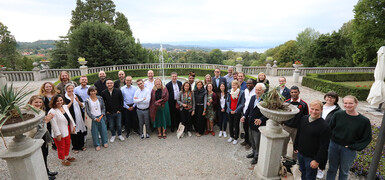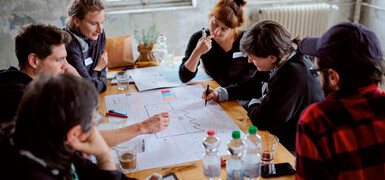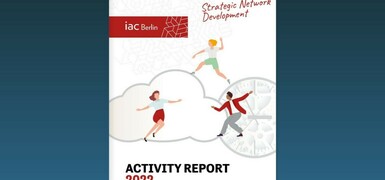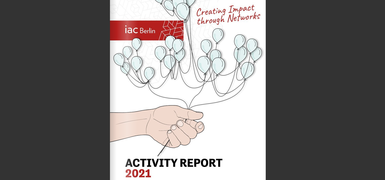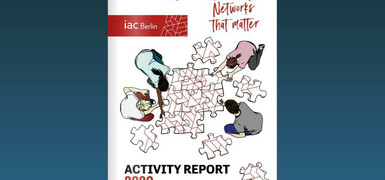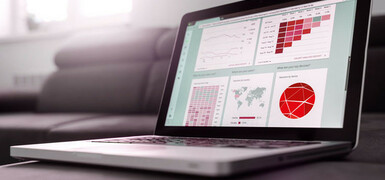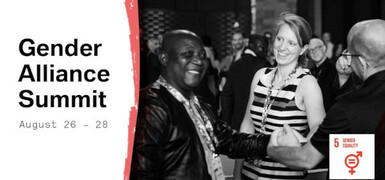
Record of Change: Organizing a scattered team that never met in person
How a pandemic twists 8 lives around the world
Humans are social animals. Aristotle made this claim more than 2,000 years ago, and neurologists have reconfirmed its validity time and time again in recent years. We need other people to survive and thrive. But what happens, when a pandemic like COVID-19 disrupts the way we live together?
In June 2020, 7 members of the Bosch Alumni Network started the podcast series Record of Change to look at the under-reported consequences of the new health imperative of social distancing.
Of these 7 organizers, no more than 3 of them ever met in person. Thus, the Bosch Alumni Network was essential in bringing people with a common interest together and supporting them to work collaboratively.
The podcast hosts talked to 8 people from vastly different backgrounds at three different points of time. Over the course of its 3 seasons—each consisting of 8 highly personal episodes—the hosts took their growing global audience on a journey around the world to show the different ways one virus was affecting individual lives. Hearing about how people adapted to their unexpected living situations and found work-arounds to the new restrictions gave listeners a renewed sense of togetherness.
We are in this together and together we should find solutions. Thus, I hope for fostering broader understandings.
We are happy to share insights and hopes created by this project.

You set out to research how a pandemic (Corona) twists 8 lives around the world. What did you find out? How does it twist these lives?
The pandemic caused so many missed dreams for the interviewees: work layoffs, economic breakdowns, postponement of jobs, new relationships strained, and major life events canceled or put on hold. What you also see is 8 people thriving and finding what new opportunities lie within the pandemic, including new approaches, strategies, and outlooks on life. So, while their lives were flipped upside-down because of the coronavirus outbreak, their stories each show their individual strengths and their perseverance through the challenges at hand. Their stories also show that yes, we are all in this together, but still the inequities are big and privileges are shared unfairly.
Did you encounter regional differences in how people reacted on the pandemic?
People definitely react differently on the pandemic. Through the interviews, it's tangible how much they trust in the context they live in, how much resources they may have and how secure they feel. I sense that the majority of our interviewees are of rather privileged backgrounds according to their individual contexts. Still, I think or hope that our listeners get broad impressions on the diversity in coping with these unknown challenges.
What surprised and / or affected you most in this first season of Record of Change?
Repeatedly, what impressed me most was how people found workarounds even in their restricted living situations. That gave me a lot of hope to see how resilient we as human beings are.
What did you personally learn from producing this podcast?
What became evident was that despite the unique environments and circumstances of our interviewees there are so many universals that unite us, showing our common experiences with the coronavirus. We have not experienced a shared experience to this scale in recent history, so hearing stories from different parts of the world can highlight our common experiences, wants, and challenges, while giving us a peek into distinct regional circumstances and approaches.
What positive impact might this podcast series produce once the third season has been aired?
In my opinion, the phrase 'we are all in this together' remained meaningless up until now, as I feel that decisionmakers in politics and economy, but also individuals rather strive for maintaining the previous normality (i. e. inequities) than acknowledging this common ground. We are in this together and together we should find solutions. Thus, I hope for fostering a broader understanding of being connected to one another.
How has this project been supported within the Bosch Alumni Network?
This project has been supported on several layers. First of all, all of the team members were lucky enough to have been selected for a program or scholarship supported by the Robert Bosch Foundation. I have to point out: we are a team of 7 and I am the only one who ever met two of the team in real life. Thus, the Bosch Alumni Network was essential to come together, find out common interests and work together remotely. And of course, this activity received some funding by the iac Berlin, as part of the 2020 Online Activities, which ensures us some remuneration for many hours of work.
What positive advice do you have for fellow Bosch Alumni Network members that think about starting their first project but are not completely sure about it, yet?
If you are convinced about your idea, just try it! If you have doubts, reach out to the Bosch Alumni Network or the iac-colleagues. There's so much expertise and will to help and collaborate, you won't be disappointed.
------------
The 8 interviewees are between 18 and mid-50 years old and include a playwright, a journalist, a restaurant owner, a flight attendant, a high school graduate student, a NGO worker, social workers etc. They are based in the USA, Hong Kong, Philippines, Greece, Turkey, Palestine, India, South Africa.
All episodes of Record of Change are available on the common podcast providers and at https://recordofchange.com.
The team:
- An Huy Tran, Duisburg, Germany
- Kecheng Fang, Hong Kong
- Matthias Jochmann, Ramallah/Palestine (currently Bonn, Germany)
- Prathap Nair, Frankfurt, Germany
- Stephanie Raible, Delaware, USA
- Thomas Reintjes, New York City, USA
Find out more at the Bosch Alumni Network project page.
